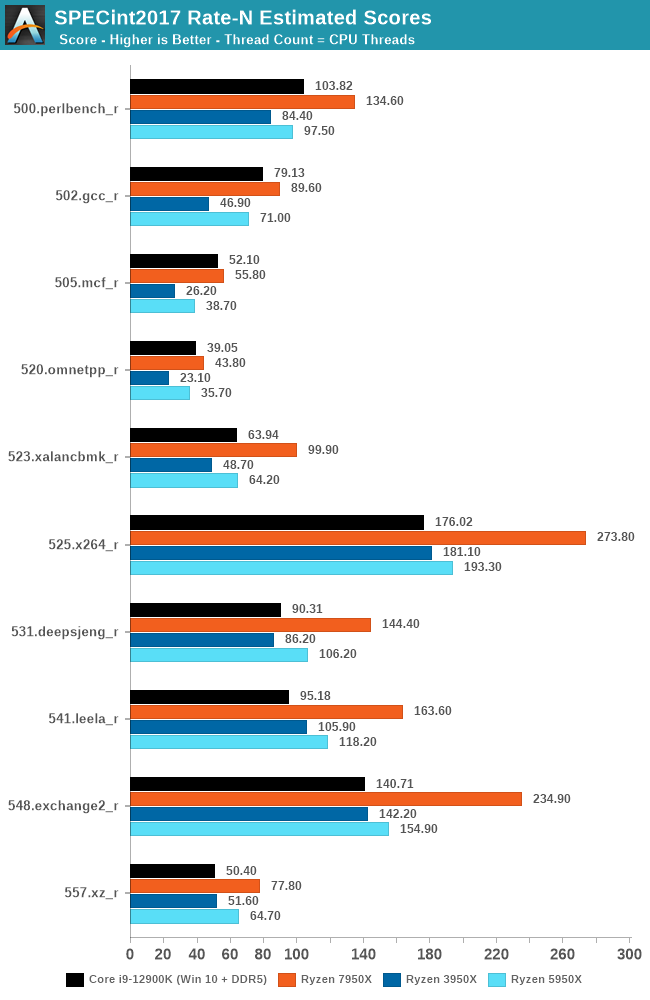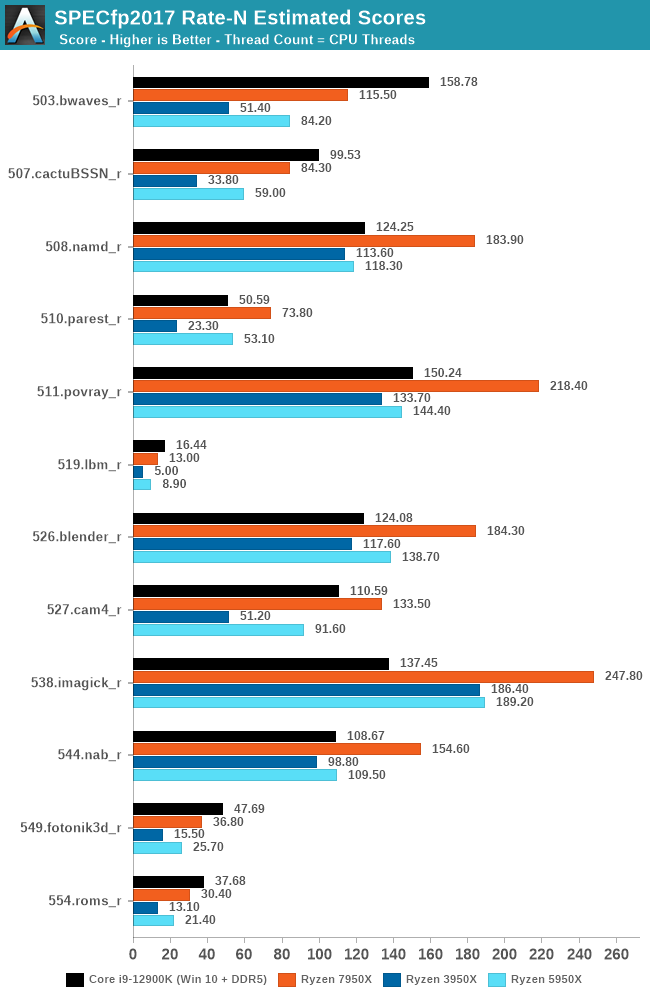AMD Zen 4 Ryzen 9 7950X and Ryzen 5 7600X Review: Retaking The High-End
by Ryan Smith & Gavin Bonshor on September 26, 2022 9:00 AM ESTSPEC2017 Multi-Threaded Results
Although single-threaded performance is important and Zen 4 has a clear advantage here, multi-threaded performance is also very important. Some variables to consider when evaluating multi-threaded performance is that desktop processor designs typically boost a single core higher, with the rest lagging in frequency behind to either stay under the thermal (TJMax) or power (TDP) envelopes. Some manufacturing processes are more efficient by design due to extensive R+D and product management, with Zen 4 looking to be much more in terms of perf per watt over Intel's Alder Lake architecture.
In the instance of the AMD Ryzen 9 7950X, it has a clear advantage over its predecessors in that it not only has a higher single core boost (5.7 GHz versus 4.9 GHz), but it also has a higher TDP than the Ryzen 9 5950X (170 W versus 105 W. This increase in TDP not only allows for a higher frequency, but it allows for a higher frequency spread across all of the cores when under full load.

Opening up our look at our SPECint2017 NT results, and we see a similar uplift in performance gains as we did in the single-threaded tests. In tests such as 500.perlbench_r, the Ryzen 9 7950 is 38% ahead of AMD's previous generation Ryzen 9 5950X, which is impressive. In 523_.xalanbmk_r, the Ryzen 9 7950 is 55% ahead of the Ryzen 9 5950X, and over 100% better in performance over the Zen 2-based Ryzen 9 3950X.

In our SPECfp2017 NT testing, certain workloads such as in 538.imagick_r showed massive increases in performance over previous generations, with a 30% uplift in performance over Zen 3. The difference here between Zen 3 and Zen 2 was marginal (10%), but Zen 4 is a more efficient core architectural design, with many improvements across the board playing a hand here; the switch to DDR5 versus DDR4, more cache per core, higher frequency, higher TDP, etc.
Overall AMD's Zen 4 architectural differences and improvements show that not only does AMD have the crown for single-threaded performance, but it's also ahead in multi-threaded performance too, at least from our SPEC2017 testing. As always when Intel or AMD makes a claim on IPC performance increases, AMD seems to be about right with claims of around 29% in ST performance and even more so in MT performance.










205 Comments
View All Comments
spaceship9876 - Monday, September 26, 2022 - link
1. I was hoping you would use a new build of 7-zip as you are using an old version.2. I was hoping you were going to test the idle power consumption when using eco mode so we could compare. Reply
boozed - Monday, September 26, 2022 - link
Sweet Baby Jesus. ReplyArbie - Monday, September 26, 2022 - link
I would really have liked to see Cinebench R23 multi with the 7950X in "105W" mode, for a more direct comparison to the 5950X. But thanks for all the work you did do here, of course. Replynandnandnand - Monday, September 26, 2022 - link
22% better at 65W, 49.7% better at 170W. I'll guess 35-40%. ReplyRezurecta - Monday, September 26, 2022 - link
Absolutely great review!! I love the architectural focus of these articles rather than the '0-60 like' benchmarks of every other site! Would love a memory scaling post as well! Replyaparangement - Monday, September 26, 2022 - link
Would it be better if using 32GB*2 memory instead of 16*2?I remember that Anandtech did a benchmark showing that 32*2 has performance advantage (maybe just using the same kit as in 12900K review? https://www.anandtech.com/show/17047/the-intel-12t... Reply
Jboy1450 - Monday, September 26, 2022 - link
Seems like you handicapped the Zen4 on purpose.Why would you not test at the AMD recommended memory settings? That's what the average user is actually going to use as AMD made it so easy to do. Also, what's with tested with a 2080 ti? Very disappointed and surprised that a well regarded site like yours would make such incomprehensible decisions. Biased maybe? Seems that way. Replyboozed - Monday, September 26, 2022 - link
Not everything has to be a conspiracy ReplyJboy1450 - Tuesday, September 27, 2022 - link
I agree, but coming to a conclusion on a platform where performance is deliberately left on the table (aside from overclocking or using PBO) seems disingenuous. By the same token, why not test AL with DDR4 since most users tend to be budget conscious and will probably choose it over the more expensive DDR5?I mean, I'm simply using their logic. Reply
Oxford Guy - Tuesday, September 27, 2022 - link
‘Most users’ has never been a logical basis for an enthusiast site. It never will be. Reply